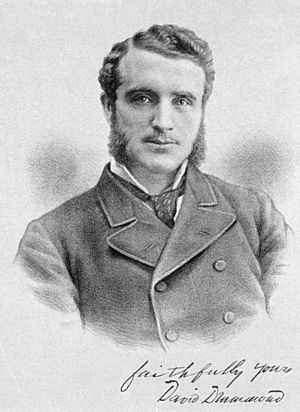David Drummond (physician) facts for kids
Quick facts for kids
Sir
David Drummond
|
|
|---|---|
 |
|
| Vice-Chancellor of the University of Durham | |
| In office 1920–1922 |
|
| Preceded by | John Stapylton Grey Pemberton |
| Succeeded by | Prof Arthur Robinson |
| Personal details | |
| Born | December 1852 |
| Died | (aged 79) |
| Alma mater | Trinity College, Dublin |
| Profession | Academic Physician Vice-Chancellor |
Sir David Drummond (born December 1852 – died April 28, 1932) was an important doctor from Ireland who also became a leader at a major university. He was the president of the British Medical Association, a big group for doctors in the United Kingdom. He also served as the Vice-Chancellor of Durham University from 1920 to 1922, which is like being the main leader of the university.
Contents
Early Life and Medical Training
David Drummond grew up in Rathgar, Dublin, Ireland. He decided to study medicine and attended Trinity College, Dublin. He worked hard and finished his medical studies in 1874, earning his degrees to become a doctor.
A Doctor in Newcastle
After finishing his studies, David Drummond moved to Newcastle, England. He started his career helping children at the Sick Children's Hospital. In 1878, he joined the Royal Victoria Infirmary in Newcastle. Here, he became an honorary pathologist and physician, meaning he was a doctor who studied diseases and treated patients. He worked there for many years, becoming a highly respected doctor. He retired from this role in 1912 as a consulting physician, which means he was an expert doctor who advised other doctors.
Helping During Wartime
During the First World War, Sir David Drummond continued to help people. He worked as a senior physician at the Northumberland War Hospital. For his important work and service during the war, he was given a special honor called the Commander of the Order of the British Empire (CBE) in January 1920.
Leading at Durham University
Sir David Drummond had a long and important career at Durham University, lasting over 50 years.
Teaching Medicine
He started by teaching different subjects related to medicine, like pathology (the study of diseases), physiology (the study of how the body works), and therapeutics (the study of how to treat diseases). Later, he became a professor, teaching the main principles and practices of medicine. He took over this important role from another famous doctor, Sir George Hare Philipson.
Vice-Chancellor of the University
From 1920 to 1922, Sir David Drummond became the Vice-Chancellor of Durham University. This is a very important leadership position, where he helped guide the university and its many colleges. Before this, he was also the president of the University's College of Medicine in Newcastle, showing his dedication to medical education.
Other Important Roles
Sir David Drummond was also a member of several important medical groups. He was a Fellow of the Royal Society of Medicine and the Royal Academy of Medicine in Ireland. These are groups for top doctors and researchers.
From 1925 to 1926, he was part of a special group called the Royal Commission on Lunacy Law and Administration. This group looked at laws and rules about mental health care to make sure they were fair and helpful.
Knighthood
For all his contributions to medicine and education, David Drummond was made a Knight in 1923. This meant he could use the title "Sir" before his name.
 | Sharif Bey |
 | Hale Woodruff |
 | Richmond Barthé |
 | Purvis Young |

